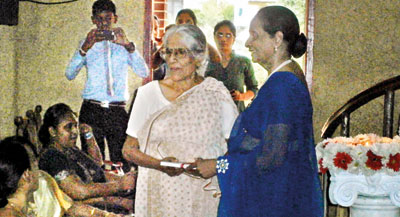She was more than just a principal, she was a gentle lady

Padmini Chandraratne (right) presents a copy of the book to Chief Guest Mrs. T.K. Ekanayake, one time vice-principal of BMS
Once the British stabilised their positon in Ceylon, missionaries were invited to come over and set up schools alongside churches and propagate Christianity while educating the children. Among the first to reach Ceylon were the Wesleyan Methodist Missionaries who set up the first school on July12, 1814 in Galle. The school then known as ‘The Galle School’ was later re-named Richmond College. Gradually several missionaries established schools in several parts of the country.
Seeing the great demand for education in Matale, two energetic English female Baptist missionaries took the initiative to start a school. The two – Ms Emily Colier and Ms A.Coleman- succeeded in their effort and the Baptist Mission Society school was born on June 27, 1907. Soon the school came to be known as ‘BMS’ for convenience.
After ten principals – all English – Ms Vera Armond, a graduate teacher from England took over in 1952. Realising her diligent service, even after the takeover of denominational schools in 1961, the Education Department decided to retain her as principal. She had the longest stint – 23 years – until her death in 1975. She was unmarried but was wedded to the school.
‘The Gentle Lady’ is the story of this gracious lady. The book is a collection of tributes by past pupils and a few teachers who served under her. Around 75 of them answered the call of an enthusiastic past pupil, Padmini Chandraratne and sent her their impressions of their ‘second mother’. Most of them had been in the school hostel under the care of Ms Armond. Naturally they had interesting stories to relate of the ‘good old days’.
For them, Ms Armond was “The most popular, efficient, energetic and lovable Principal at BMS”.
Her one time vice-principal, Mrs. T.K. Ekanayake, delivering the keynote address at the launch of ‘The Gentle Lady’, had no hesitation in saying that there is no other principal who can be compared with Ms Armond. ‘Her kindness, her generosity, her dedication and commitment cannot be matched,” she said. “Today 99% cannot claim to have these qualities.”
She recalled how Ms Armond sold her properties in England and spent the money for the welfare of BMS children. “Ms Armond was always looking round to see what she could give and not what she could take”.
She bought a Morris Minor car with her own money without spending a cent of the school money and used the car for the benefit of the students. Mrs. Ekanayake remembered how the car was used to take the students home when they fell ill, without worrying the parents. On many occasions she took them to hospital and made sure they were looked after.

“Taking a cue from Ms Armond we should always see what we could give and not what we can take. Like her we must always try to be a role model,” she stressed.
In the book, the headings of the contributions by past pupils illustrate how much they respected her. To quote a few: ‘The caring personality’; ‘Tough but charming and pleasant’; ‘Treated all equally’; ‘A fine human being’;’Concern for others’; ‘Efficient, Energetic, Lovable’; ‘Epitome of love and kindness’.
Ms Armond’s keenness to learn Sinhala mainly to converse with the minor staff had often provided a fund of humour for the students. Her addressing the driver as ‘driver-thuma’ or her inquiry during a trip ‘cake pettiya suwase innnavada’ are just two anecdotes.
While most articles relate interesting stories, one past pupil has contributed just one line. “Thank you, Ms Vera Armond, for being an inspirational mentor in our lives!’
Her popularity was not only among the students. She was an acknowledged community worker. Her close relationship with the parents helped to develop the school.
Her initiative brought fame to Matale in sports. It was in her era that Matale was synonymous with hockey when the BMS team won five trophies in all-island tournaments in 1965. The athletic team also became all-island champions.
Today the school has been re-named ‘Sri Sanghamitta Balika Maha Vidyalaya’ but to many it’s still ‘BMS’.
The contents of ‘The Gentle Lady’, while paying tribute to a hard-working principal, provides food for thought in the current environment in the education sector.


